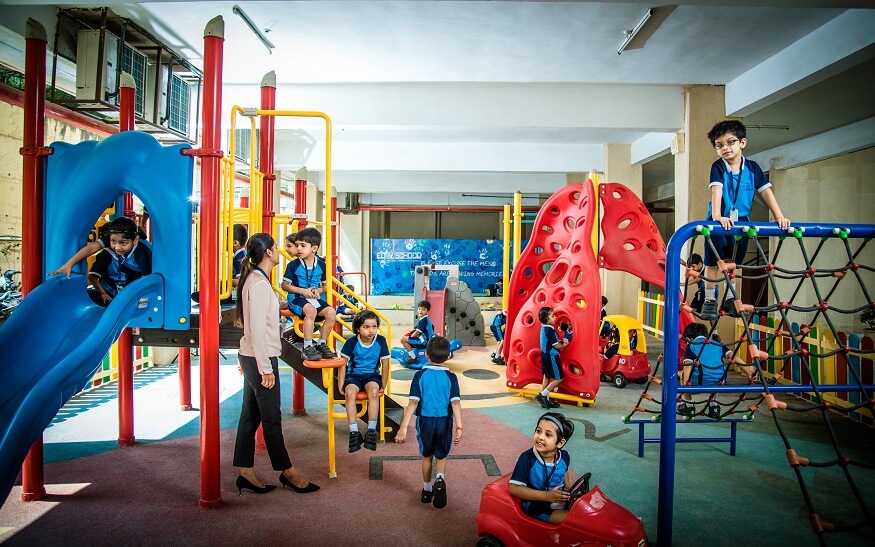A kindergarten refers to a pre-school educational institution where young children, typically aged between three and five years old, receive early childhood education and development. It is often considered as the first step in a child’s formal education. Kindergartens are commonly known as nursery schools or preschools. These establishments provide a nurturing and structured environment where children engage in various activities that promote social, emotional, cognitive, and physical development. The curriculum typically emphasises play-based learning, fostering creativity, imagination, and exploration.
Within a kindergarten setting, children participate in a range of educational experiences such as storytelling, music and movement, arts and crafts, outdoor play, and basic numeracy and literacy activities. Qualified early years practitioners facilitate these activities, ensuring that each child receives individual attention and support. Kindergartens play a vital role in preparing children for primary education by helping them develop important skills, such as communication, problem-solving, and social interaction. These early educational experiences also lay the foundation for a lifelong love of learning, fostering curiosity and a sense of wonder in young children.
Also Read: 10 Life Skills Activities for Kindergarten Students
Advantages of starting kindergarten late
Kindergarten often marks the formal commencement of a child’s academic journey. However, the debate about the perfect age to begin school is not without merit. In recent years, the concept of ‘academic redshirting’ — postponing the entry into kindergarten — has gained ground. By delaying kindergarten, parents are giving their children additional time to mature physically, emotionally, and intellectually.
Physical Growth
One of the most tangible benefits of delaying kindergarten is the opportunity it provides for a child to grow physically. Children develop at different rates and those who are younger may not have the same level of physical stamina as their older peers. Extended periods of focus, sitting, writing, and other physical aspects of school life may prove daunting for those with lesser physical maturity. By waiting an extra year, a child may be more physically prepared for the rigours of kindergarten.
Emotional and Social Maturation
Emotional and social maturation is another crucial aspect to consider. The social structure of a classroom is very different from a home environment or even a nursery setting. There is a higher level of interaction and cooperation expected at school. Younger children might find it challenging to navigate these dynamics, leading to frustration and, in some cases, behavioural issues. A delayed start can provide the additional time needed to mature emotionally and socially.
Moreover, kindergarten introduces a wide range of emotions and experiences that can be overwhelming for a young child. Whether it’s handling the disappointment of not winning a game or dealing with the joy and confusion of making new friends, an extra year can help children learn to better manage their emotions.
Cognitive Development
Cognitive development is another area where starting kindergarten late can have notable advantages. Intellectual readiness for school varies greatly among children. Those who start school later may enter with a higher level of cognitive maturity, making it easier to grasp the concepts taught in the kindergarten curriculum. Additionally, starting school later could potentially mitigate the risk of being labelled as slow learners. Some children simply need more time to reach their developmental milestones. By allowing an additional year for cognitive growth, parents might prevent their children from struggling academically and being labelled unfairly.
Long-Term Academic Performance
Research indicates that children who start kindergarten later tend to perform better academically over the long term. This could be attributed to their more advanced physical, emotional, and cognitive readiness at the outset. They are more likely to cope better with academic pressures and exhibit higher self-confidence, which can have a positive impact on their learning trajectory.
Disadvantages of starting kindergarten late
Initiating one’s academic journey is a significant milestone, and choosing when to start can sometimes become a quandary for parents. Increasingly, some parents opt for a delayed entry to kindergarten, also known as ‘academic redshirting.’ While this approach can offer numerous benefits, it is essential to acknowledge and understand the potential disadvantages that might emerge.
Social Discrepancies
While delaying kindergarten might seem advantageous in terms of physical and emotional maturity, it can inadvertently create a significant age and maturity gap amongst classmates. A child starting late may be up to a year older than their peers, and as they progress through school, this gap might result in social discrepancies.
As children advance into their teenage years, the late starters might reach adolescence earlier than their peers, which could cause them to feel out of place. These discrepancies may manifest as difficulties fitting in, which could impact their social growth and self-esteem.
Also Read: The Importance of Play-based Learning in Kindergarten
Delayed Exposure to Structured Learning
One of the main objectives of kindergarten is to provide an early introduction to structured learning. By delaying kindergarten, children might miss out on this early exposure, which plays a pivotal role in fostering important skills like following instructions, cooperative play, and structured work habits.
Early education often lays the foundation for lifelong learning habits. The delay could potentially disadvantage children in the long term, as they might not be as accustomed to the school environment and the associated responsibilities and expectations as their peers who started earlier.
Financial Implications
The financial implications of delaying kindergarten are often overlooked. An additional year of preschool or alternative care can be a significant financial burden for many families. In contrast, kindergarten, being part of the public education system in the UK, does not incur direct costs for parents.
Moreover, a delayed start to kindergarten means an extension of the overall educational timeline, potentially delaying the point at which the child enters the workforce and becomes financially independent.
Possibility of Underestimation
Delaying the start of kindergarten might inadvertently result in adults underestimating the capabilities of young children. Children are naturally curious and capable learners. By postponing formal education, there’s a risk of underutilised this inherent potential.
Early exposure to kindergarten can nurture this curiosity and provide the right stimuli for intellectual and social growth. Without this exposure, children might not be challenged enough, potentially leading to a slower pace of learning and development.
Academic Outcomes
Though there are studies suggesting that older students perform better academically, it’s important to note that the effect tends to diminish over time. Research shows that the academic advantages associated with being older at school entry decrease as children move through school and are minimal by adolescence.
Also Read: Tips for Smooth Kindergarten Transitions: From Home to School
Conclusion
The decision to begin a child’s formal education journey should be well-considered, recognising that the goal is not just academic success, but the cultivation of well-rounded, confident, and curious individuals. Parents, educators, and policy-makers must work together to ensure the educational system accommodates the diverse needs and timelines of all children, regardless of when they start school.
If you are looking for a high-quality schools in Mumbai, Pune, and Hyderabad for your child, EuroSchool is a great option. We offer a unique curriculum, excellent teachers, and state-of-the-art facilities. Your child is sure to have a fun and enriching experience at EuroSchool.










